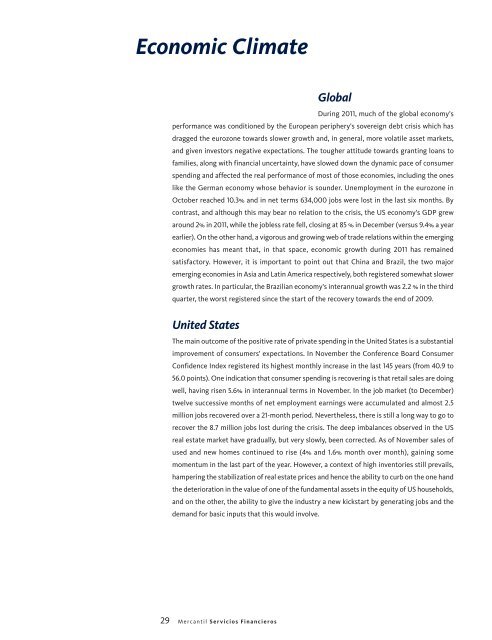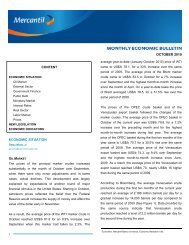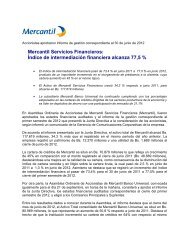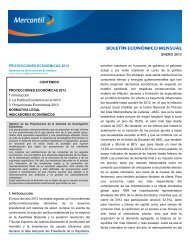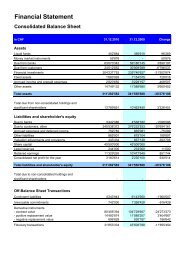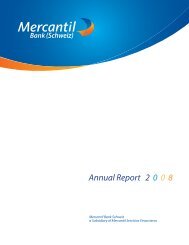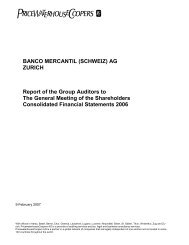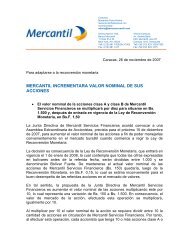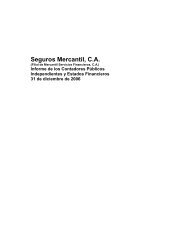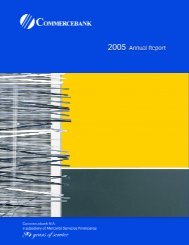Annualreport
Annualreport
Annualreport
Create successful ePaper yourself
Turn your PDF publications into a flip-book with our unique Google optimized e-Paper software.
Economic Climate<br />
Global<br />
During 2011, much of the global economy's<br />
performance was conditioned by the European periphery's sovereign debt crisis which has<br />
dragged the eurozone towards slower growth and, in general, more volatile asset markets,<br />
and given investors negative expectations. The tougher attitude towards granting loans to<br />
families, along with financial uncertainty, have slowed down the dynamic pace of consumer<br />
spending and affected the real performance of most of those economies, including the ones<br />
like the German economy whose behavior is sounder. Unemployment in the eurozone in<br />
October reached 10.3% and in net terms 634,000 jobs were lost in the last six months. By<br />
contrast, and although this may bear no relation to the crisis, the US economy's GDP grew<br />
around 2% in 2011, while the jobless rate fell, closing at 85 % in December (versus 9.4% a year<br />
earlier). On the other hand, a vigorous and growing web of trade relations within the emerging<br />
economies has meant that, in that space, economic growth during 2011 has remained<br />
satisfactory. However, it is important to point out that China and Brazil, the two major<br />
emerging economies in Asia and Latin America respectively, both registered somewhat slower<br />
growth rates. In particular, the Brazilian economy's interannual growth was 2.2 % in the third<br />
quarter, the worst registered since the start of the recovery towards the end of 2009.<br />
United States<br />
The main outcome of the positive rate of private spending in the United States is a substantial<br />
improvement of consumers' expectations. In November the Conference Board Consumer<br />
Confidence Index registered its highest monthly increase in the last 145 years (from 40.9 to<br />
56.0 points). One indication that consumer spending is recovering is that retail sales are doing<br />
well, having risen 5.6% in interannual terms in November. In the job market (to December)<br />
twelve successive months of net employment earnings were accumulated and almost 2.5<br />
million jobs recovered over a 21-month period. Nevertheless, there is still a long way to go to<br />
recover the 8.7 million jobs lost during the crisis. The deep imbalances observed in the US<br />
real estate market have gradually, but very slowly, been corrected. As of November sales of<br />
used and new homes continued to rise (4% and 1.6% month over month), gaining some<br />
momentum in the last part of the year. However, a context of high inventories still prevails,<br />
hampering the stabilization of real estate prices and hence the ability to curb on the one hand<br />
the deterioration in the value of one of the fundamental assets in the equity of US households,<br />
and on the other, the ability to give the industry a new kickstart by generating jobs and the<br />
demand for basic inputs that this would involve.<br />
29 Mercantil Servicios Financieros


